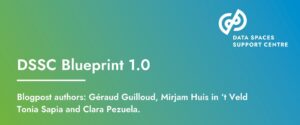This content was created by the Data Sharing Coalition, one of the founding partners of the CoE-DSC.
The Data Sharing Coalition supports organisations with realising use cases at scale to exploit value potential from data sharing and helps organisations to create required trust mechanisms to share data trusted and secure. In our blog section ‘Q&A with’, you learn more about our participants and their thoughts, vision and ideas about data sharing. In this Q&A, Ous Haidar, Law and Data Science Researcher, and Judith Kamalski, Managing Director at Brightlands Institute for Smart Society (BISS), share their thoughts.
1. Could you introduce your organisation?
BISS is an interfaculty research institute at Maastricht University, located in Heerlen on the Brightlands Smart Services Campus. BISS consists of a team of professors and researchers from all faculties, supported by developers and data engineers, making us a truly interdisciplinary team. We use Maastricht University’s academic knowledge and expertise in data science to solve societal and business challenges for our customers. These range from commercial organisations that approach us to ask how to make better use of their data to improve their services, to governmental organisations that ask us to help with a data-driven approach to societal issues such as poverty or access to the labour market.
Our mission is to empower people and organisations to solve societal and business challenges through the socially responsible application of digital technologies. For many if not all of the challenges we work on, technology is only one part of the answer. Even the best high-tech tool or application is useless if it’s not used properly, or even worse, if it’s not used at all. Several of our past projects have strengthened us in our belief that often the challenge doesn’t lie in technology, but in people and organisations. Also, the mere fact that technology can solve an issue, doesn’t mean it necessarily should. For example, what if it increases social inequality because it only serves certain groups in society? What if it doesn’t take ethical or legal considerations into account? Therefore, in all BISS projects, we combine technological possibilities with insights from behavioral science, ethics, psychology, and law to ensure that what we deliver truly brings those that we are trying to help a step forward.
2. To what extent is your organisation involved in data sharing (within and across sectors)?
Data sharing is at the heart of BISS’s value proposition and Privacy-Preserving Technology is one of our main value creation elements to gain insights. At BISS, we help our customers (commercial or governmental organisations) to validate, cross-check, and generate insights from their data. From the start, we pay attention to ethical, legal, and societal considerations. For example, we combine different data sources and deliver value via insights that were previously inaccessible. Our team consists of scientists, developers, and data engineers, covering the whole spectrum of data sharing activities. The emphasis depends on the challenge that a particular project aims to solve, but it goes without saying that we always apply a multidisciplinary perspective to the challenge we are working on.
The majority of our projects include data sharing as an important building block. For example, data sharing is a crucial component of our recently submitted consortium grant proposal for the Brightlands ELSA-lab Poverty and Debt (ELSA stands for ethical, legal, and societal aspects of AI). In this project, we plan to connect data from different sources to develop a predictive model of indicators of poverty, to develop impactful preventive measures. It’s complicated to predict a risk of poverty when only one data source is used, but combining different sources is a promising solution. Again, especially in a sensitive domain, it’s imperative that ethical, legal, and societal aspects are part of the technological solution being developed.
3. Why is or should sharing data be important for your industry or domain?
Sharing data is crucial to solve societal and business challenges. Examples are ensuring good health and wellbeing, improving access to the labour market in a border region, preventing and solving the problem of poverty, or unlocking the value of data in order to improve products and services. In all of these challenges, privacy-preserving methodologies for data sharing play a pivotal role, as addressing these complex issues with insights from one single database will not provide a comprehensive solution. Instead, sharing vacancies across neighbouring countries, sharing financial data across governmental organisations, or sharing patient data across hospitals will. Looking at the latter example, BISS is part of the team that created the Dutch Personal Health Train (PHT). The PHT is a collective term for technologies that make it possible to use and combine data from different sources to support several practical uses, such as ‘joint decision making’ in oncology.
4. What are the most promising data sharing developments and trends you see in your sector?
Due to competition, trust, and privacy issues, there is a growing demand for data sharing solutions that feature Privacy-Preserving Technologies such as Multi-party Computation and Federated Learning. In addition, making data FAIR (Findable, Accessible, Interoperable, and Reusable) when sharing it, has become a necessity for an agile and advanced technological solution. And finally, we are happy to see an increased need for interdisciplinary approaches. Not only do we believe that this is the right way forward, we are also very well positioned as an interdisciplinary team to play a role in this.
The question ‘how can data be shared in an ethically, legally, and societally acceptable way?’ is and will remain a central question, and will become even more relevant in the future.
5. How do you see the future of data sharing, and what steps are you currently taking in that direction?
We believe that the question ‘how can data be shared in an ethically, legally, and societally acceptable way?’ is and will remain a central question, and will become even more relevant in the future. Many of today’s challenges are complex and cannot be solved using one data source. The combination of different types of data and different sources is crucial. In addition, what is needed is an ‘ELSA-by-design’ approach, where technology goes hand in hand with ethics and legislation. Regularly, examples can be seen on the news that illustrate that failure to do so can cause serious issues. We are working on fine-tuning this approach within every project we do.
While we thoroughly enjoy executing projects with our customers and partners, the ideal situation is to truly empower their employees to be able to execute these projects themselves, with the appropriate skills and knowledge of data sharing methodologies and ethical and legal considerations. We are pleased to see that more and more organisations are approaching us for staff training. To meet this demand, BISS develops custom-made training programmes and workshops, but we also offer occasional open courses.
6. Why are you participating in the Data Sharing Coalition?
BISS joined the Data Sharing Coalition because we firmly believe that advances in data sharing cannot be accomplished alone. Sharing knowledge, insights, and perspectives across disciplines, sectors, and nations benefits the development of data sharing solutions, instead of reinventing the wheel every time.
BISS is always looking for new opportunities to work with others. We thank the Data Sharing Coalition for allowing us to share our vision on data sharing, to work together with participants of the coalition on innovative ideas, to learn from their expertise, and to pass on our experiences and findings.




